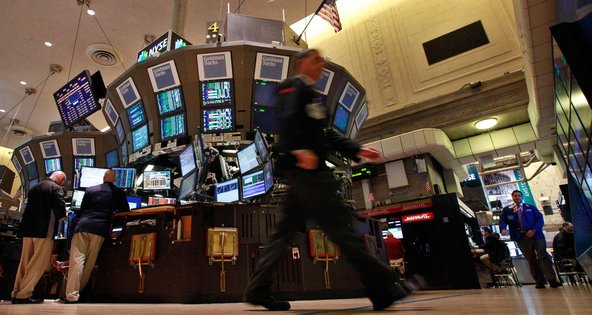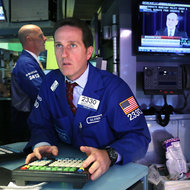 Brendan McDermid/ReutersNew York Stock Exchange trading data gave some clients a split-second advantage.
Brendan McDermid/ReutersNew York Stock Exchange trading data gave some clients a split-second advantage.
In the latest federal action against a major exchange, the New York Stock Exchange settled accusations on Friday that its trading data gave select clients a split-second advantage over retail investors.
The Securities and Exchange Commission issued a civil enforcement action citing the Big Board for “compliance failures” that allowed certain customers to receive stock data before the broader public. The improper actions, which began in 2008, ran afoul of safeguards set up to promote fairness in a system known for favoring elite investors.
The S.E.C. forced the exchange to adopt a battery of internal controls and pay a $5 million penalty. While the fine is a token sum for the country’s biggest and most prominent trading platform, it represents the first penalty the agency has levied against an exchange.
“Improper early access to market data, even measured in milliseconds, can in today’s markets be a real and substantial advantage that disproportionately disadvantages retail and long-term investors,” Robert Khuzami, the agency’s enforcement director, said in a statement. “That is why S.E.C. rules mandate that exchanges give the public fair access to basic market data.”
In a statement, the Big Board played down the significance of the action. The S.E.C., the exchange noted, did not unearth intentional wrongdoing or evidence that the problems harmed individual investors. Instead, the exchange blamed the lapses on “technology issues,” which it said had since been fixed.
 Spencer Platt/Getty ImagesTraders on the floor of the New York Stock Exchange on Thursday.
Spencer Platt/Getty ImagesTraders on the floor of the New York Stock Exchange on Thursday.
“N.Y.S.E. Euronext is pleased to have this matter resolved, and believes that the settlement is in the best interest of its share owners, clients and employees,” Duncan L. Niederauer, the company’s chief executive, said in the statement. “We will continue to take every responsible measure to ensure that our market operates with the utmost fairness and transparency.”
The action on Friday was part of a wider federal crackdown on the nation’s biggest exchanges. The S.E.C. has penalized the Direct Edge exchange for having “weak internal controls,” and it is also pursuing the Chicago Board Options Exchange for not properly policing the markets.
The sprawling investigation has grown after the so-called flash crash on May 6, 2010, when the Dow Jones industrial average plummeted more than 700 points in minutes before quickly recovering. Federal authorities and Congressional committees have focused their scrutiny on technological breakdowns and high-speed trading.
“Today’s action by the S.E.C. affirms what many have believed for years: that our U.S. capital markets are threatened by those with the resources and access to get split-second advantages over the rest of us,” Senator Carl Levin, a Michigan Democrat whose Permanent Subcommittee on Investigations has examined high-speed trading, said in a statement.
In its most prominent case, the S.E.C. is investigating Nasdaq in connection with Facebook’s botched public offering in May. BATS Global Markets has also acknowledged receiving a request from the agency, which is examining whether collaboration between BATS and high-frequency trading firms could hinder competition. Separately, the agency is looking into BATS’s own aborted public offering.
The companies often blame their woes on technological malfunctions. But in the New York Stock Exchange case, regulators described a more pervasive problem, tracing the improper actions to multiple technological mishaps and compliance issues.
In highlighting disparities in the distribution of stock data, the S.E.C. pointed to an “internal N.Y.S.E. system” and a “software issue.” The problems, regulators said, caused the exchange to send stock prices and other data to certain customers milliseconds, or even multiple seconds, before it released information more widely. The breakdown, which first came to light after the flash crash, dates back to 2008.
Despite the scope of the issues, the S.E.C. suggested they were preventable.
The exchange, regulators say, failed to keep computer files that detailed the timing of data feeds. The exchange’s compliance department also steered clear of major technology decisions, according to the S.E.C. The compliance staff, for example, did not help design or adopt the exchange’s market data systems. Under the terms of the settlement, the exchange must hire an independent consultant to study its “market data systems.”
“The violations at N.Y.S.E. may have been technological, but they were not technical,” said Daniel M. Hawke, chief of the agency’s Market Abuse Unit, which is leading the investigations into various exchanges. “Robust technology governance is just as important to preventing investor harm as any other compliance or supervisory function.”
Article source: http://dealbook.nytimes.com/2012/09/14/n-y-s-e-settles-regulatory-action-on-trading-data/?partner=rss&emc=rss
Speak Your Mind
You must be logged in to post a comment.